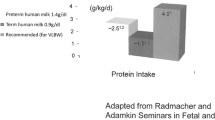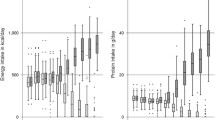Abstract
Hemorrhagic disease of the newborn is a disease of breast-fed infants. We have followed 119 exclusively breast-fed infants for up to 6 months of age, who received 1 mg of vitamin K1intramuscularly at birth. As vitamin K is undetectable in cord blood, the only other source in breast-fed infants is human milk We found persistently low vitamin K1plasma concentrations in these infants by 4 weeks, and vitamin K concentrations at 2, 4, 6, 8, 12, and 26 weeks averaged 1.18 ± 0.99, 0.50 ± 0.70, 0.16 ± 0.07, 0.20 ± 0.20, 0.25 ± 0.34, and 0.24 ± 0.23 ng/mL, respectively (lower limit of adult normal = 0.5 ng/mL). Vitamin K1in breast milk at 2, 6, 12, and 26 weeks was also very low, averaging 1.17 ± 0.70, 0.95 ± 0.50, 1.15 ± 0.62, and 0.87 ± 0.50mg/mL, respectively. This may be secondary to low maternal vitamin K1intakes or inability of vitamin K1to penetrate human milk We had previously reported a relatively high mean vitamin K intake of 316 ± 548 µg in 20 lactating women during the first 6 months of lactation (mean of 60, 3-day dietary recalls) which greatly exceeded the recommended daily allowance of 1.tg/kg/day. The vitamin K content of foods was recently revised downward utilizing newer analytical methods (Booth et al. 1995). Recalculating maternal vitamin K intakes in this original cohort resulted in a dramatic decrease in intake to 74 ± 57.tg/day, an amount closely approximating 1 µg/kg/day. We have completed 69 new dietary recalls in 23 lactating women and, combining these data with the previous study, determined a maternal vitamin K1mean intake of 65 ± 48 µg/day (0.8-1.314/kg/day). Other than plasma vitamin Ktconcentrations, PIVKA (undercarboxylated prothrombin produced in the absence of vitamin K) is a marker of vitamin K deficiency. We measured PIVKA in 156 cord bloods of full-term infants. Seventy-five (48%) had a significantly elevated PIVKA (>_0.1 absorption units per milliliter). Seventy-seven of these infants who were exclusively breast-fed subsequently had no detectable PIVKA at 4 weeks, but by 8 weeks, 3 were again positive for PIVKA (prothrombin times were normal). Breast-fed infants may benefit from increased maternal vitamin K intakes (>114/kg/day) during pregnancy and lactation. A supplement of 5 mg of vitamin K to lactating mothers will increase the concentration in human milk to 80.0 ± 37.7 ng/mL and significantly increase infant plasma vitamin K (Greer et al. 1997).
Access this chapter
Tax calculation will be finalised at checkout
Purchases are for personal use only
Preview
Unable to display preview. Download preview PDF.
Similar content being viewed by others
References
Booth SL, Sadowski JA, Pennington JAT. Phylloquinone (vitamin K1) content of foods in the U.S. Food and Drug Administration’s total diet study. J Agric Food Chem 1995;43:1574–1579.
Greer FR. The importance of vitamin K as a nutrient during the first year of life. Nutr Res 1995;15:289–310.
Greer FR, Marshall S, Cherry J, Suttie JW. Vitamin K status of lactating mothers, human milk, and breast-feeding infants. Pediatrics 1991;88:751–756.
Greer FR, Marshall SP, Suttie JW. Improving the vitamin K status of breastfeeding infants with maternal vitamin K supplements. Pediatrics 1997;99:88–92.
Greer FR, Marshall SP, Severson RR, Smith DA, Shearer MJ, Pace DG, Joubert PH. A new mixed micellar preparation for oral vitamin K prophylaxis: randomised, controlled comparison with an intramuscular formulation in breast fed infants. Arch Dis Child 1998;79:300–305.
Haroon Y, Shearer MJ, Rahim S, Gunn WG, McEnery G, BarkhanP.The content of phylloquinone (vitamin K1) in human milk, cows’ milk and infant formula foods determined by high-performance liquid chromatography. J Nutr 1982;112:1105–1117.
[NRC] National Research Council Food, Commission on Life Sciences, Nutrition Board. Recommended Dietary Allowances. 10thed. Washington DC: National Academy Press; 1988. p. 111.
Motohara K, Kuroki Y, Kan H, Endo F, Matsuda I. Detection of vitamin K deficiency by use of an enzyme-linked immunosorbent assay for circulating abnormal prothrombin. Pediatr Res 1985; 19:354–357.
Shearer MJ. Phylloquinone (vitamin K1) in serum or plasma by HPLC. In: Fidanza F, editor. Nutritional
Status Assessment: A Manual for Population Studies. London: Chapman & Hall; 1991. pp 214–220.
von Kries R, Greer FR, Suttie JW. Assessment of vitamin K status of the newborn infant. J Pediatr Gastroenterol Nutr 1993;16:231–238.
Author information
Authors and Affiliations
Editor information
Editors and Affiliations
Rights and permissions
Copyright information
© 2001 Springer Science+Business Media New York
About this chapter
Cite this chapter
Greer, F.R. (2001). Are Breast-Fed Infants Vitamin K Deficient?. In: Newburg, D.S. (eds) Bioactive Components of Human Milk. Advances in Experimental Medicine and Biology, vol 501. Springer, Boston, MA. https://doi.org/10.1007/978-1-4615-1371-1_48
Download citation
DOI: https://doi.org/10.1007/978-1-4615-1371-1_48
Publisher Name: Springer, Boston, MA
Print ISBN: 978-1-4613-5521-2
Online ISBN: 978-1-4615-1371-1
eBook Packages: Springer Book Archive




